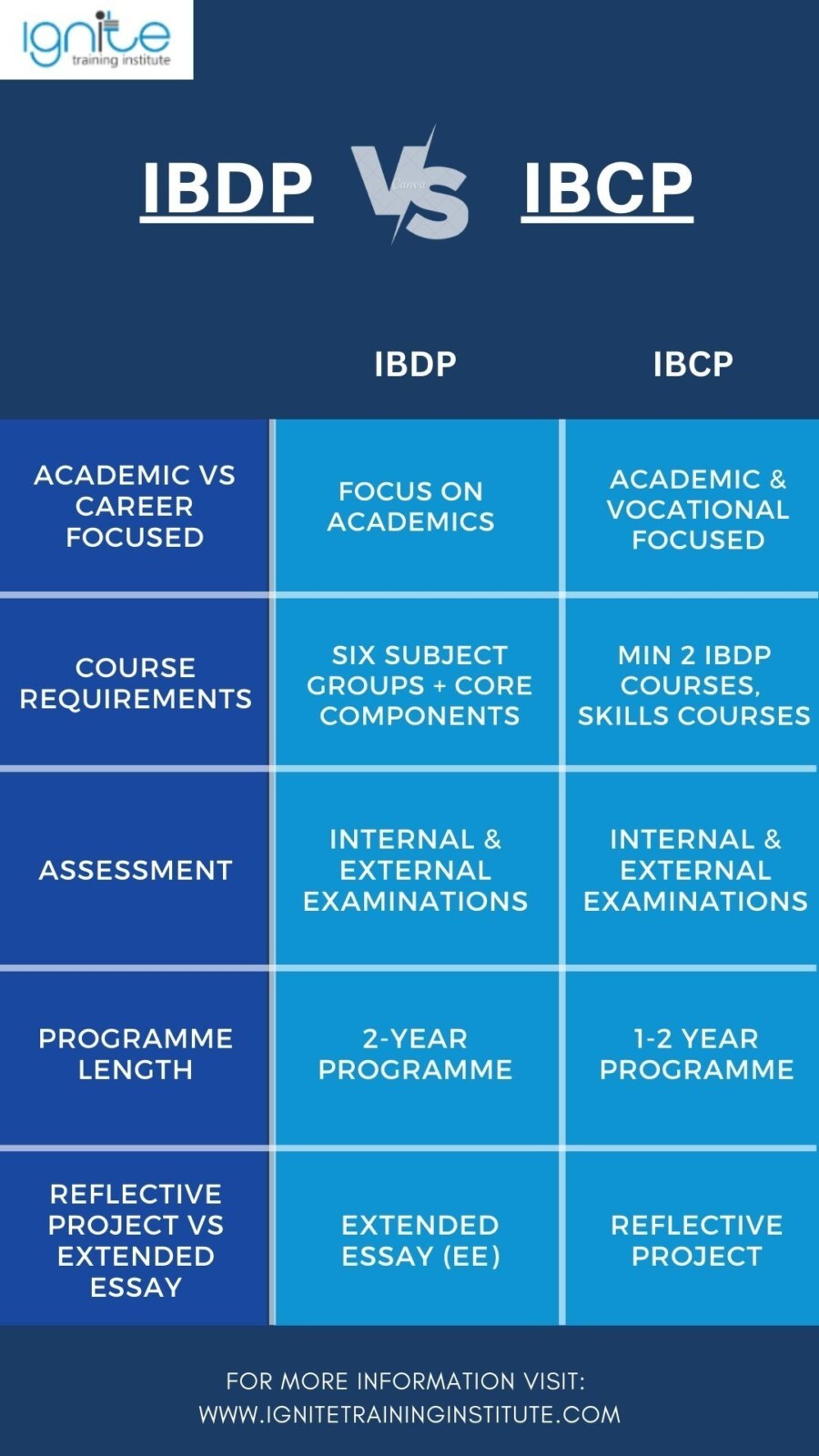The International Baccalaureate (IB) programme is a highly regarded educational system that prepares students for success in higher education and beyond. However, there are two distinct programmes within the IB system: the IB Diploma Programme (IBDP) and the IB Career-Related Programme (IBCP).
While both programmes are designed to provide students with a rigorous and challenging education, they have some key differences resulting in IBCP VS IBDP comparison.
In this blog, we will explore the differences between IBCP and IBDP, and help students and parents understand which programme might be the best fit for their individual goals and interests. Furthermore, Ignite Training Institute offers comprehensive tutoring support for the IB curriculum – IBDP & MYP.

What Is IB Career-Related Programme (IBCP)?
The IB Career-Related Programme (IBCP) is a specialized educational programme offered by the International Baccalaureate (IB) organization. It is designed for students aged 16 to 19 years old who want to combine academic studies with career-related learning.
The IBCP aims to prepare students for higher education and the world of work by providing them with a solid academic foundation, practical skills, and real-world experience. It consists of three core components: a career-related study, a personal and professional skills course, and at least two IB Diploma Programme (IBDP) courses.
The career-related study component allows students to focus on a particular career path or field of interest. This can include vocational training, apprenticeships, or work experience. The personal and professional skills course helps students develop the skills they need to succeed in their chosen careers, including communication, critical thinking, and time management.
In addition to the career-related study and personal and professional skills course, students in the IBCP must take at least two IBDP courses. These courses provide students with a rigorous academic foundation in a variety of subjects, including languages, sciences, humanities, and mathematics.
Related: List Of Top 10 Benefits Of The IB Diploma Programme
What Is IB Diploma Programme (IBDP) ?
The IB Diploma Programme (IBDP) is an internationally recognized educational programme offered by the International Baccalaureate (IB) organization. It is designed for students aged 16 to 19 years old and is known for its rigorous academic curriculum that prepares students for higher education and beyond.
The IBDP is a two-year programme that consists of six subject groups: Language and Literature, Language Acquisition, Individuals and Societies, Sciences, Mathematics, and the Arts. Students must take one subject from each group, with the exception of the Arts group which is optional. Additionally, students must complete three core requirements: Theory of Knowledge (TOK), Extended Essay (EE), and Creativity, Activity, and Service (CAS).
Theory of Knowledge (TOK) is a course that aims to develop critical thinking skills and an understanding of the nature of knowledge across different disciplines. The Extended Essay (EE) is an independent research project where students explore a topic of their choice in-depth. Creativity, Activity, and Service (CAS) requires students to participate in a variety of extracurricular activities and community service projects.
Related: 2023 Review: List Of Top 8 IB Curriculum Schools In Dubai
IBCP VS IBDP: 5 Differences That You Didn’t Know
The International Baccalaureate (IBO) offers IB educational programmes for students aged 16 to 19 years old: the IB Diploma Programme (IBDP) and the IB Career-Related Programme (IBCP). While both programmes share some similarities, there are several key differences between them. Here are five differences between the IBCP and IBDP:

1. Academic vs. Career-Related Focus
The IBDP has a primary focus on academic studies and is designed to prepare students for higher education. In contrast, the IBCP is career-related and combines academic studies with vocational or career-related learning. The IBCP is designed to prepare students for both higher education and the world of work.
2. Course Requirements
The IBDP requires students to take six subject groups, including Language and Literature, Language Acquisition, Individuals and Societies, Sciences, Mathematics, and the Arts. Students must also complete three core requirements: Theory of Knowledge (TOK), Extended Essay (EE), and Creativity, Activity, and Service (CAS). In contrast, the IBCP requires students to take at least two IBDP courses, a career-related study, and a personal and professional skills course.
3. Assessment
Both programmes use a combination of internal assessments and external examinations to evaluate students. However, the IBDP exams are standardized and internationally recognized, while the IBCP exams are developed by the school or programme and may not be as widely recognized.
4. Program Length
The IBDP is a two-year programme, while the IBCP is typically a one- to two-year programme, depending on the specific requirements of the career-related study component.
5. Reflective Project VS Extended Essay (EE)
The IBCP culminates in a reflective project that allows students to showcase their skills and knowledge in a real-world context. In contrast, the IBDP requires students to complete an independent research project called the Extended Essay (EE).
Related: IB Economics Exam: Paper Details & 10 Prep Tips
IBCP University Recognition Overview
The International Baccalaureate Career-related Programme (IBCP) is increasingly gaining recognition from universities around the world. The IBCP is designed for students who wish to engage in career-focused education while earning an internationally recognized qualification.
Universities value the IBCP for its blend of academic rigour and practical career skills, which provides students with a strong foundation for higher education and professional success.
The programme’s emphasis on real-world applications, alongside academic coursework, equips students with the skills necessary for both academic and career pathways. Many institutions recognize the IBCP as a credible and valuable qualification, often considering it favourably in the admissions process.
As the IBCP continues to grow in popularity, its acceptance and recognition among universities are likely to increase, reflecting its effectiveness in preparing students for future academic and career pursuits.
Related: IBDP Curriculum: A 2024 Guide For Academic Excellence
IBCP VS IBDP: Which Is Better For College Admissions?
Both the IB Career-Related Programme (IBCP) and the IB Diploma Programme (IBDP) are highly regarded by colleges and universities around the world. Ultimately, which one is better for college admissions depends on the individual student’s goals, interests, and strengths.
The IBDP is known for its rigorous academic curriculum, which includes six subject groups, three core requirements, and external examinations. It is a great option for students who want a well-rounded education that prepares them for higher education in a variety of fields.
On the other hand, the IBCP is designed for students who want to combine academic studies with career-related learning. It includes a career-related study, a personal and professional skills course, and at least two IBDP courses. It is a great option for students who have a clear idea of their career path and want to gain practical skills and experience in addition to their academic studies.
Ultimately, both programmes can prepare students for success in college and beyond. Colleges and universities recognize the value of both programmes and often look for students who have taken challenging and rigorous courses in high school, regardless of which programme they are in.
It is important for students to choose the programme that aligns with their interests, goals, and strengths, as they are more likely to excel and thrive in a programme that they are passionate about.
Related: Top 5 Benefits Of The IB Curriculum You Must Know To Get Started
Ignite Training Institute – #1 IB Tutors In Dubai
Ignite Training Institute is the #1 IB Tutor in Dubai, providing top-quality tutoring services to students in the International Baccalaureate (IB) programme. Our team of highly qualified and experienced tutors is dedicated to helping students excel in their International Baccalaureate (IB) programme studies.
We understand that the IB programme is challenging and rigorous, and our tutors are committed to providing students with the support and guidance students need to succeed. We offer personalized one-on-one tutoring and small group classes that are tailored to meet the individual needs and learning styles of each candidate.
Our IB tutors have a deep understanding of the IB curriculum and assessments, and they are skilled in teaching complex concepts in a way that is easy to understand. Our trainers are passionate about helping students reach their full potential and achieve their academic and career goals.
FAQs
1. Which Is Better IBDP Or IBCP?
Determining whether the IBDP or IBCP is better for students depends on their personal goals and interests. The IBDP offers a rigorous academic curriculum, while the IBCP blends academic studies with career-related learning, making it an excellent choice for students with a specific career path in mind.
2. Do US Universities Accept IBCP?
Yes, many US universities accept the IB Career-Related Programme (IBCP) as a valid credential for admission. The IBCP is acknowledged as a comprehensive and challenging educational program that equips students for success in both college and their future careers.
3. What Is The IBCP Equivalent To?
The IBCP (International Border Customs Procedure) is equivalent to the U.S. Customs and Border Protection (CBP) procedures for managing and regulating international trade and customs compliance. It ensures standardized customs practices across borders.
4. Is IBCP Recognised?
Yes, IBCP (International Body of Compliance Professionals) is recognized within the compliance and regulatory community for its standards and certifications. It is acknowledged by various organizations for its contributions to industry best practices.
5. Is IBCP Accepted In The UK?
The International Bank of Commerce and Private Banking (IBCP) is not recognized or accepted in the UK. Financial transactions and institutions in the UK typically adhere to local regulations and established banks or financial entities.
6. Is IBCP Accepted In India?
Yes, the International Baccalaureate Career-related Programme (IBCP) is accepted in India. In September 2021, the Association of Indian Universities (AIU) recognized the IBCP as equivalent to the 12th standard of Indian school boards, facilitating university admissions for IBCP graduates.
7. Is IBCP Difficult For Students?
The IBCP combines academic study with practical, career-related learning. Its difficulty varies based on a student’s chosen courses and career pathway. While it offers a rigorous curriculum, the blend of academic and vocational elements can be engaging and manageable for students passionate about their selected fields.
8. What Are The Entry Requirements For IBCP?
Entry requirements for the IBCP typically include a good academic record, proficiency in English, and a strong interest in a specific career field. Some institutions may also require a personal statement outlining the student’s career aspirations.
9. Does IBCP Get A Diploma?
Yes, upon successful completion of the IBCP, students are awarded the IB Career-related Programme certificate. Additionally, students who complete their career-related studies, such as the Pearson BTEC Level 3 Diploma, receive a separate certification for that component.
Conclusion

In conclusion, both the International Baccalaureate Career-related Programme (IBCP) and International Baccalaureate Diploma Programme (IBDP) offer rigorous and challenging educational pathways for students. The IBCP VS IBDP comparison led to an understanding that IBCP focuses on career-related studies alongside the IB’s core components, while the IBDP provides a comprehensive and academically focused curriculum.
The IBCP provides students with a unique opportunity to blend their academic studies with vocational training and practical experience. It allows students to gain a broad range of skills and knowledge, preparing them for both higher education and the workforce. On the other hand, the IBDP is designed to provide students with a well-rounded and challenging academic program that prepares them for university studies and beyond.
Related: 50 Engaging IB CAS Project Ideas For IB Diploma Students


